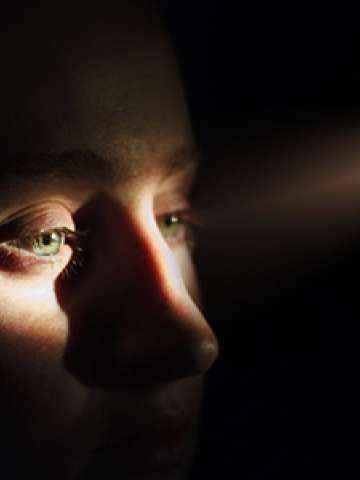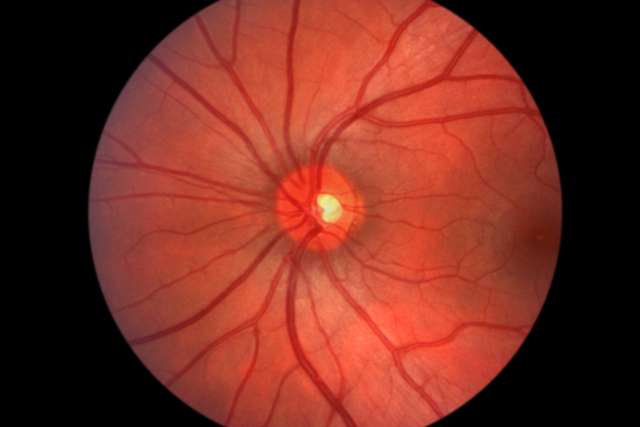Retina Disease Care
UCLA Health retina disease specialists offer the latest treatments for conditions affecting the retina from experienced retina specialist doctors.

Why Choose UCLA Health for Retina Disease Care
Our retina disease specialists provide a wide range of services for patients with conditions affecting the retina, the inside lining of the eye that allows you to see. As part of the team at UCLA Health Stein Eye and Doheny Eye Institutes and Doheny Eye Centers, our specialists among the best in the nation in ophthalmology care, as listed by U.S. News & World Report.
Highlights of our program include:
Research focus: Our specialists are active researchers, continually learning and researching new treatment options in collaboration with leading retinologists and eye genetics experts. This research emphasis allows eligible patients access to new and promising treatments through clinical trials. For example, through our Vision Rehabilitation Center, we've led studies to customize robotic devices that assist patients with low vision. We are also actively involved in developing gene therapies and novel treatments for inherited retinal conditions. We collaborate with multiple research groups around the world to ensure patients can participate in the most advanced research available.
Comprehensive services: We offer advanced diagnostic tools and treatment for all types of retinal conditions, including rare and inherited retinal disorders evaluated by retina specialist doctors. Through the Vision Genetics Center, our ophthalmic genetics team uses advanced genetic testing and counseling to diagnose and manage inherited retinal diseases, offering expert care for patients with conditions such as retinitis pigmentosa, Stargardt disease and von Hippel-Lindau disease.
Coordinated care: Many diseases that affect the eyes involve care from multiple specialists. We work closely with other physicians, such as those in ophthalmic genetics, endocrinology or oncology, to provide comprehensive, coordinated care.
Teaching and training: We train residents and fellows and draw international audiences with our teaching courses. When you choose our team, you are choosing recognized, highly trained experts.
Our Areas of Care in Retina & Eye Genetics
Retinal disease specialists and ophthalmic genetics specialists offer a wide range of services. We treat patients through several centers and programs, including:
Diabetic Eye Disease Care by Retina Specialists
We offer comprehensive eye care to people with diabetes through the Diabetic Eye Disease and Retinal Vascular Center. Our specialists work closely with other experts to ensure you receive comprehensive care. A research focus allows us to continually expand treatment options, offering you the most effective therapies.
Macular Disease Treated by Retinologists
We research and treat macular degeneration through the Macular Disease Center. Patients in the Center may be eligible for new treatments through clinical trials. Our specialists work closely with experts in the Vision Rehabilitation Center to help people with low vision increase function and maximize their quality of life.
Ophthalmic Genetics and Inherited Eye Genetics Care
Our physicians have rare, specialized expertise in eye disorders with genetic factors. We use every necessary tool to diagnose genetic eye conditions, including new techniques available through clinical trials. Our ophthalmic genetics physicians have the advanced expertise required to interpret these tests, ensuring that we provide accurate, detailed diagnoses.
As a designated Clinical Care Center for von Hippel-Lindau disease, we also care for patients with complex multisystem genetic conditions. We are also actively involved in research and clinical trials aimed at developing gene-based and other emerging therapies for inherited retinal diseases.
Ophthalmic Oncology for Retina-Related Tumors
Specialists in the Ophthalmic Oncology Center research, diagnose and treat eye tumors. The Center has served as a hub for national, longstanding studies to research eye cancers. We partner with specialists in UCLA Health Jonsson Comprehensive Cancer Center to deliver team-based, comprehensive care.
Vision Rehabilitation for Retinal Disease
If you have low vision, you may benefit from treatment within the Vision Rehabilitation Center. We offer assistive devices or digital technology to increase your vision ability. When appropriate, we can refer you to occupational therapy to provide further assistance with independent living.
Retinal Diseases We Treat
We treat a comprehensive range of diseases that affect the retina, including genetic conditions and rare eye diseases. Some of the most common conditions we treat include:
- Achromatopsia (incomplete and complete): A genetic condition that affects the perception of colors and reduce the ability to see fine details (central vision acuity)
- Albinism (ocular and oculocutaneous): A genetic disorder that leads to unusually light hair, skin and eyes and affects retinal and visual development
- Choroideremia: A rare disorder causing progressive vision loss, usually starting with night blindness
- Cohen syndrome: A rare genetic disorder affecting multiple parts of the body, often causing nearsightedness and tissue breakdown at the back of the eye (retinal dystrophy)
- Cone-rod dystrophies: A group of disorders that leads to breakdown in the rods and cones, the light-sensitive cells of the retina
- Congenital stationary night blindness: A group of retinal disorders that causes difficulty seeing in low light but do not lead to breakdown of the retina
- Diabetic retinopathy: Damage to blood vessels in the eyes that can lead to vision loss and possibly blindness
- Epiretinal membrane: Also referred to as “macular pucker”; a very thin layer of scar tissue that grows over the macula (part of the retina) in the back of the eye; causes blurry or distorted vision; surgery stops the worsening and can result in improvement
- Inherited retinal disorders: A group of genetic disorders, including retinitis pigmentosa, that causes cell breakdown in the retina
- Macular degeneration: A condition that causes blurred vision and vision loss, either due to leaky blood vessels or a deteriorating retina
- Macular dystrophies: A group of disorders that causes breakdown in the macula, the central part of the retina containing a large concentration of light-sensitive cells
- Macular hole: A small hole in the center of the light-sensitive eye tissue (retina) that causes blurred or distorted vision
- Marfan syndrome: A genetic disorder that affects connective tissues, often causing multiple eye problems such as low vision, glaucoma, crossed eyes (strabismus) or retinal detachment
- Phakomatoses (neurocutaneous syndromes): Neurological conditions, such as neurofibromatosis, tuberous sclerosis, Sturge-Weber syndrome and ataxia telangiectasia that can affect the eye, optic nerve and other parts of the body
- Retinal detachment: A medical emergency that occurs when the layer of tissue in the back of the eye (retina) pulls away from supporting tissues and blood vessels
- Retinal tear: A small break in the retina, often due to traumatic injury, aging or eye surgery
- Retinitis pigmentosa (rod-cone dystrophy): A group of genetic disorders that cause retina damage and slow, progressive vision loss
- Stargardt disease: A more specific form of macular dystrophy that causes vision loss due to buildup of material under the retina that primarily affects the macula and central vision
- Usher syndrome (types I, II and III): A genetic condition that causes progressive hearing and vision loss
- von Hippel-Lindau disease (VHL): A type of phakomatoses that causes tumors and cysts to form throughout the body, including in the retina (retinal hemangioblastoma)
Treatments We Offer for Retinal Disease
Our retinal disease and ophthalmic genetics specialists offer a comprehensive range of treatments, including:
- Intravitreal injections: Injects medications directly into the vitreous, a jelly-like fluid near the retina at the back of the eye, to control infection, inflammation, diabetic retinopathy symptoms or certain types of age-related macular degeneration
- Laser surgery: Uses a laser to heat small parts of the retina and repair a retinal tear
- Low vision aids: Eyeglasses, contact lenses, magnifiers, computer technology and assistive robotic devices are common tools to help people with low vision
- Pneumatic retinopexy: Injects gas or air into the eye to treat retinal detachment
- Retinal reattachment: Surgically reattaches the retina to the back of the eye
- Scatter laser photocoagulation: Reduces blood vessel leakage in the retina and prevents new blood vessels from forming, often used to treat retinal vascular disease such as diabetic retinopathy
- Scleral buckling: Attaches a piece of silicone material to the eye's surface to relieve the pulling of retinal detachment
- Vision rehabilitation: Specialists at our Vision Rehabilitation Center help patients maximize visual function and quality of life
- Vitrectomy: Removes the jelly-like substance (vitreous gel) inside the eye and replaces it with air, gas or liquid; procedure may be used during treatment for a retinal tear or detachment, diabetic retinopathy, macular hole or eye trauma
Clinical Trials in Retinal Disease and Eye Genetics
Our specialists continually research promising new treatments and medications, such as gene therapies, for genetic eye diseases. Eligible patients may receive treatment through a clinical trial.
Evaluation and management of complications by retina specialists
Some people may experience complications related to a genetic eye disease, such as fluid buildup between cells in the retina (macular edema) or early-onset cataracts. Others may develop red lesions (vascular lesions) or small deposits of protein and calcium on the nerve that help you see (optic nerve drusen).
Our specialists evaluate and identify complications arising from a genetic eye disease. We treat these complications using advanced techniques and tools.
Genetic Testing and Counseling for Inherited Retinal Diseases
Genetic testing can identify mutations in genes, chromosomes or proteins that increase the risk of or cause genetic eye conditions. It can help with family planning and assessing at-risk family members. It may also help identify patients who may qualify for clinical trials.
The results can help our experts confirm a diagnosis, recommend treatments to help you manage the disorder or refer you to a clinical trial. Genetic counselors review the tests and provide information about what it means for patients and their families to have an inherited eye disease.
When appropriate, patients may work with UCLA Health’s medical genetics program long-term to manage side effects or complications of a hereditary condition.
Meet Our Team of Retina Specialists & Retinologists
Our retinal disorders and ophthalmic genetics specialists are experts in identifying all types of rare and inherited eye diseases. We participate in research studies and clinical trials to offer patients the newest, most promising treatment options.
Full-Time Faculty
Retinal and Ophthalmic Genetics
Staff Optometrists
Contact Us for Retina Specialist Care
To request an appointment with a retina disease specialist, call 310-206-7474.
To request an appointment with a vision genetics specialist, call 310-794-5400.












